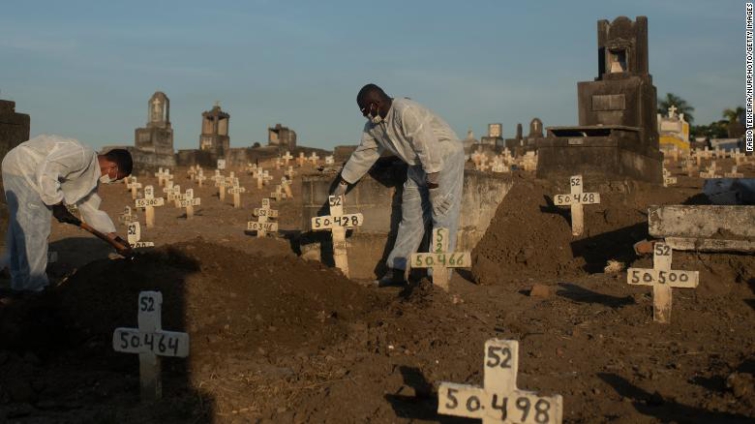More than 4 million people around the world have died of Covid-19, according to data from Johns Hopkins University.
In total, three countries account for more than a third of all global deaths. The United States, which has the highest number of fatalities at 606,000, accounts for 15% of the global total, followed by Brazil and India.
The grim milestone, announced Wednesday, comes as new cases and deaths are dropping in the US and Europe, where significant numbers of residents have been vaccinated. But some developing countries, such as Indonesia, are still facing surging outbreaks, as authorities struggle to secure enough vaccines to protect citizens.
The Delta variant, a more transmissible and possibly more dangerous strain of coronavirus, is also contributing to an increase in cases in some countries and regions. In the US, the Delta variant now makes up more than half of all new infections, according to estimates from the US Centers for Disease Control and Prevention (CDC).
An average of 7,900 Covid-19 deaths were reported each day over the past week, according to JHU. That is 46% less than the global peak of more than 14,700 daily deaths in January, but 57% higher than the pace of about 5,000 daily deaths from this time last year.
The global death toll exceeded 1 million on September 18, 2020, 191 days after the World Health Organization declared the novel coronavirus outbreak a global pandemic. It took 115 days for the global death toll to hit 2 million, 88 days to surpass 3 million, and another 89 days to reach 4 million.
Given the difficulty in accurately tracking the spread of the virus especially in the developing world, many experts believe the global death toll is likely significantly higher than the officially reported number.
In a statement on Thursday, United Nations Secretary-General Antonio Guterres warned the pandemic is "far from over," warning of the emergence of more transmissible, more deadly variants that are more likely to undermine the effectiveness of current vaccines if the virus is allowed to continue to spread.
"Vaccines offer a ray of hope -- but most of the world is still in the shadows. The virus is outpacing vaccine distribution," he said, calling for a global plan to boost vaccine production, ensure equitable distribution and tackle vaccine hesitancy.
"To realize this plan, I am calling for an Emergency Task Force that brings together all the countries with vaccine production capacities, the World Health Organization, the global vaccine alliance GAVI and international financial institutions able to deal with the relevant pharmaceutical companies and manufacturers, and other key stakeholders," he said.
Latest Stories
-
Look beyond the money, we are providing essential services – Jospong Group to critics
32 minutes -
Finance Minister outlines measures to tackle Ghana’s large payable build-up in 2024
50 minutes -
Vatican Succession: Could an African Pope lead a Global Church?
1 hour -
Political parties rally nationwide protest over Chief Justice suspension on May 5
2 hours -
Today’s Front pages: Friday, April 25, 2025
2 hours -
NACOC says recent drug busts reflect enhanced operational effectiveness
3 hours -
Parliament’s Sanitation Committee rejects call to scrap YEA-Zoomlion contract; cites job losses
4 hours -
SuperSport secures FIFA Club World Cup 25 broadcast rights
4 hours -
GES to promote eligible deputy directors on Mahama’s order
4 hours -
Bank of Ghana reports 33% rise in staff-involved fraud in 2024
4 hours -
South Africa’s finance minister says he won’t resign after VAT U-turn
4 hours -
Ntim Fordjour urges equal urgency in prosecuting major drug traffickers
4 hours -
Mpraeso MP urges gov’t to hand over Damang Mine to Ghanaian firm after transition
4 hours -
‘Ghana needs watchdogs, not cheerleaders’ – Bright Simons calls out empty praise politics over IMF endorsements
4 hours -
NACOC seizes 73 suspected cocaine slabs at Swiss Port bound for Netherlands; arrests 4 Ghanaians
4 hours

